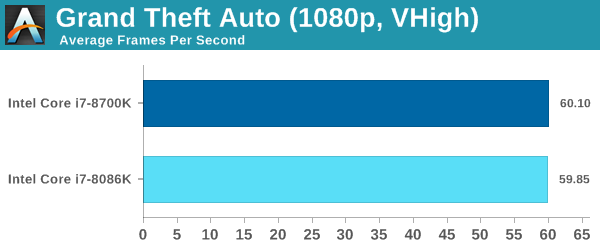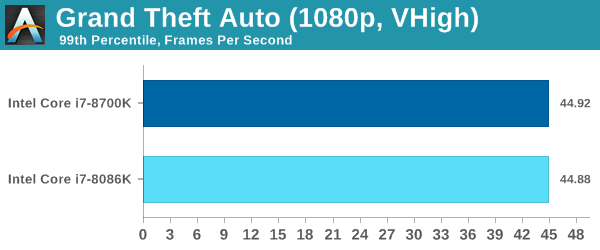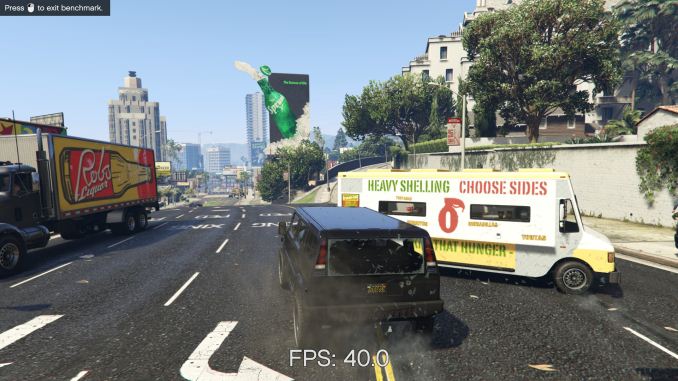The Intel Core i7-8086K Review
by Ian Cutress on June 11, 2018 8:00 AM EST- Posted in
- CPUs
- Intel
- Core i7
- Anniversary
- Coffee Lake
- i7-8086K
- 5 GHz
- 8086K
- 5.0 GHz
Grand Theft Auto V
The highly anticipated iteration of the Grand Theft Auto franchise hit the shelves on April 14th 2015, with both AMD and NVIDIA in tow to help optimize the title. GTA doesn’t provide graphical presets, but opens up the options to users and extends the boundaries by pushing even the hardest systems to the limit using Rockstar’s Advanced Game Engine under DirectX 11. Whether the user is flying high in the mountains with long draw distances or dealing with assorted trash in the city, when cranked up to maximum it creates stunning visuals but hard work for both the CPU and the GPU.
For our test we have scripted a version of the in-game benchmark. The in-game benchmark consists of five scenarios: four short panning shots with varying lighting and weather effects, and a fifth action sequence that lasts around 90 seconds. We use only the final part of the benchmark, which combines a flight scene in a jet followed by an inner city drive-by through several intersections followed by ramming a tanker that explodes, causing other cars to explode as well. This is a mix of distance rendering followed by a detailed near-rendering action sequence, and the title thankfully spits out frame time data.
There are no presets for the graphics options on GTA, allowing the user to adjust options such as population density and distance scaling on sliders, but others such as texture/shadow/shader/water quality from Low to Very High. Other options include MSAA, soft shadows, post effects, shadow resolution and extended draw distance options. There is a handy option at the top which shows how much video memory the options are expected to consume, with obvious repercussions if a user requests more video memory than is present on the card (although there’s no obvious indication if you have a low end GPU with lots of GPU memory, like an R7 240 4GB).
To that end, we run the benchmark at 1920x1080 using an average of Very High on the settings, and also at 4K using High on most of them. We take the average results of four runs, reporting frame rate averages, 99th percentiles, and our time under analysis.
All of our benchmark results can also be found in our benchmark engine, Bench.
ASRock RX 580 Performance













111 Comments
View All Comments
bug77 - Monday, June 11, 2018 - link
So what happened here? It looks like Intel's play with frequencies made this throttle more often. At least that the only explanation I can find for 8700k ending up better in so many tests.Tkan215215 - Monday, June 11, 2018 - link
As always its called milking and wallet ripper they know people still Buy them anywaybug77 - Monday, June 11, 2018 - link
I wasn't expecting this to be a cost-effective part, but rather a collector-oriented one.But mostly worse than a standard part is surely unexpected.
AutomaticTaco - Monday, June 11, 2018 - link
I don't think it's worse as much as the silicon lottery exists regardless of it. In other words, even among speed binned parts some OC better than others. And that's true for both the 8086K, the 8700K or any others.just4U - Wednesday, June 13, 2018 - link
I agree bug,I'd be very interested in this processor if it brought something to the table to justify it's cost. The 4790K did with a better thermal design. They could have added a kick ass cooler, or a factory delid and redo for better thermals. Something .. anything besides a small bump in clocks.
Drumsticks - Monday, June 11, 2018 - link
It might be milking, but I kind of have a hard time believing that. They're only making 50,000 of them, and only at about a 21% markup over the 8700k. But they're flat out giving away 16% of the chips. I doubt Intel is going to milk much money beyond their regular business from this. It's the companies 50th anniversary year, so I'm going to guess it's just positive fanfare and a collector's item related to that and it happening to be an anniversary for a well known processor at the same time.Old_Fogie_Late_Bloomer - Monday, June 11, 2018 - link
I enjoy hating Intel as much as the next guy but this is a good point.Revenue from 41,914 8086Ks: $17,813,450
Revenue from 50,000 8700Ks: $17,500,000 (at $350 apiece)
The remaining $313,450 doesn't really feel like a lot of money when you factor in binning the chips and dealing with all the other overhead of the promotion, especially since Intel isn't getting all of that money anyway.
SanX - Monday, June 11, 2018 - link
This was actually not the revenue but the PROFIT you blind people with easily effed brains. The production cost for this chip was probably less then 20 bucks. The processor in your phone is probably more hi-tech, has more transistors, more cores, and was made on more advances factories with 10nm litho being all sold below $25.mkaibear - Tuesday, June 12, 2018 - link
What are you smoking?His maths is bang on, although he neglects the cut the retailer will be taking off the top for that. They aren't making that much profit off each chip.
SanX - Tuesday, June 12, 2018 - link
They aren't making that much profit off each chip? If they aren't making huge profits then all mobile chip factories lose money by selling the same transistor count processors like the one in Apple or Samsung phones for just $25